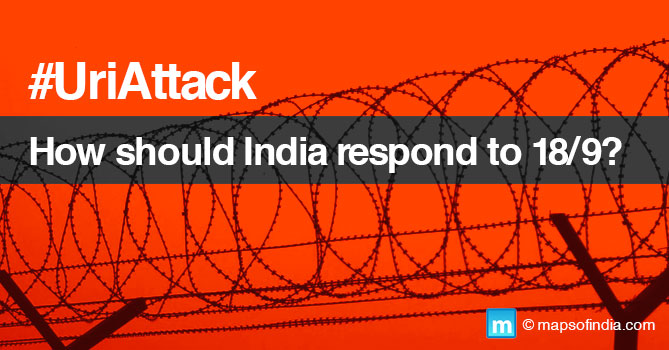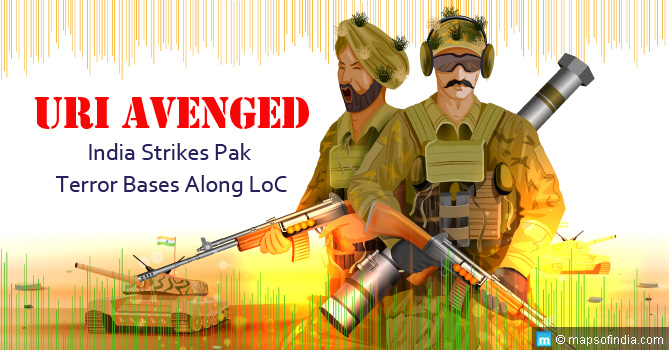Post the bloody terror attack on an Indian Army Brigade location in Uri, earlier this month, wherein 18 soldiers were martyred and another 20 were seriously wounded, India has begun to respond by diplomatically shaming and isolating Pakistan at the UN General Assembly.
Read : Indus Water Treaty Between India and Pakistan
In the coming week, India’s foreign Minister Sushma Swaraj will be addressing the UNGA where she is expected to strongly rebut and expose Pakistan’s role in supporting terrorism emanating from its land. This is likely to be the first step in a series of well-coordinated diplomatic offensive aimed at exposing Pakistan’s duplicitous behaviour.
India’s military response, as and when it comes, will take its own course. But beyond diplomatic and military response, there is a lot that can be done against Pakistan economically that will raise the cost for Pakistan for running this asymmetrical war against India.
Cornering Pakistan economically
Besides abrogating the Indus Water Treaty (IWT), which happens to be the most effective and potent non-military option for India, India must withdraw the Most Favoured Nation (MFN) status given to Pakistan as a first step towards launching an all-out effort to corner Pakistan economically.
India offers significant advantage to Pakistan for sourcing low cost, high quality manufactured goods, pharmaceuticals, animal feed, automotive parts and commodities. India must now turn off this supply. Let Pakistan source its requirement from other nations, which will increase the cost of these goods and further drain the country of precious foreign exchange. This is certain to hurt Pakistan whose government is near bankrupt.
Getting the MNCs to act
There are several Multinational companies operating in both India and Pakistan.
Between 1947 and 1970, Pakistan was designated by the US State Department and the CIA as the most favoured investment destination for leading MNCs at the time. These MNCs were encouraged to invest actively in Pakistan.
Companies like Lever, Grindlays, Glaxo, Shell, ICI and British American Tobacco, invested and prospered in Pakistan. In fact, these companies can take major credit for transforming a part of Pakistan, from an agrarian mindset to a modern corporate mindset, at least for a section of professionals in Pakistan.
Today, companies like IBM, Telenor, Schlumberger, Etisalat, Mobilink, Proctor & Gamble and Nestle are active in Pakistan and their presence adds to the traditional list of MNCs that have been in Pakistan for a long time. Since most of these giants are also present in India, where the stakes are much larger, India holds significant leverage and must use it to apply pressure on the Pakistani government to move away from its self-destructing path of supporting terror, which is already hurting Pakistan’s chances of an economic recovery.
The present economic situation in Pakistan is precarious and is being sustained by doles and financial assistance being received mainly from China, US and Saudi Arabia, though the last two are toning down their earlier enthusiasm in funding Pakistan.
The government has little financial capacity to sustain even a limited conflict with India, let alone fight a full-fledged war, and largely relies on nuclear rhetoric to keep India at bay.
India must call this bluff and apply economic pressure on these companies to force them to reduce their investments in Pakistan, if not completely withdraw; just as China has done for years, by forcing countries and companies to refrain from holding diplomatic and economic relations with Taiwan.
Post-Cold war, it must be understood that global relations have been mainly driven by economic interests and individual companies are most sensitive to economic gains and profitability, and therefore remain most vulnerable to economic threat and pressure. The US government has very successfully forced companies to toe its line in context of countries like Cuba, Iran, Venezuela and North Korea.
Likewise, China frequently uses its economic clout to pressure governments and companies to fall in line with its strategic interests. It’s now time for India to stand up and force these MNCs to choose sides. The India story is far bigger and more exciting than what Pakistan can ever be and it’s time for India to encash this value.
Pakistan stares at being declared a ‘State Sponsor of Terrorism’
Republican Senator Ted Poe, has moved a Bill to declare Pakistan a ‘State sponsor of terror’ and that is significant in itself, irrespective of whether the Obama administration will allow it to pass in its last days in office.
The EU, too, has taken notice of human rights abuses by the Pakistani military in Balochistan and is said to be mulling economic sanctions. This is a good time for India to apply full pressure on MNCs to act now and increase the economic cost for Pakistan. Losing jobs at a time when the economy is fully stressed, will only raise people pressure on its own government to reign in terror and that should be India’s long term objective.
In a nuclear scenario, military options for India are limited but raising the economic cost from within Pakistan will certainly make it difficult for any government to survive, and civil unrest is the last thing that Pakistani Army will want at this stage.
When coordinated along with other options like turning the water tap off by walking out of the IWT, Pakistani government will have little choice but to reign in its rogue military from any further overt or covert adventurism.
Boycotting everything Pakistani – Artists, Goods, Cricket
Indian cinema, television, arts and culture is rich in variety and content and admired all over the world. The influence of Indian cinema and music can be seen across Pakistan, whose citizens follow the latest developments across the border.
Due to this interest, over the last couple of decades, Pakistani actors have been coming to India seeking work in cinema and music industry. It is time for India to put a stop to this. Pakistan has never been reciprocal in extending similar opportunity to Indian artists and under the present hostile atmosphere prevailing between the two countries, India must ban these artists from performing any further in India. The message to Pakistan must be loud and clear, India has zero tolerance for terror and is now willing to walk the talk.
India should do the same with all Pakistani goods and commodities that make its way to India. Let Pakistan trade and industry feel the price of its government’s support for cross-border terrorism.
Cricket has a popular following in Pakistan and BCCI has rightly announced that it will not allow any further sporting contact with Pakistan. This move is certain to have its impact on a near bankrupt Pakistan Cricket Board that was looking to playing with India to bail itself out. As it is, test playing nations are reticent on playing in Pakistan, therefore, this move by BCCI will certainly hurt.
This is the time for India to unite and turn the pressure on Pakistan to either give up its support for terrorism and behave responsibly, or be isolated and ultimately boycotted by the comity of nations.
Read More:
Farooq Abdullah Doubts India’s Legitimacy Over Kashmir, but Why?
PakBorderBrutality: India Hits Back Strongly
Uri Terror Attack: It’s a Call to Action
Uri attack – Effective retaliatory options before India
Where is Uri
Interesting Facts About Indian Army
Can The Kashmir Issue Be Ever Resolved Through Peace Talks?
Who was Burhan Wani
Government’s Outreach to Youth From Kashmir
The NIT Srinagar Issue
Militant Groups in India
Kishtwar: Another Burning Chapter in Kashmir
Article 370 of Indian Constitution – Historical Background and Provisions





